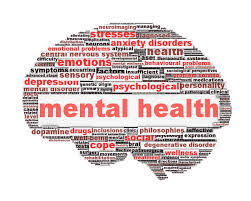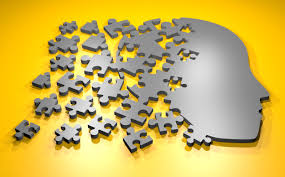Unveiling the Stigma: How Talking about Mental Illness Can Lead to Healing and Cure
Mental illness. Two words that carry immense weight and yet remain shrouded in silence. It’s a topic we often tiptoe around, avoiding uncomfortable conversations and burying our heads in the sand. But what if I told you that talking about mental illness could be the key to unlocking healing and cure? Yes, you heard me right! By unveiling the stigma surrounding mental health, we can empower individuals to seek help, provide support, and ultimately break free from the chains of their suffering. So let’s dive deep into this taboo topic together and discover how opening up about mental illness can pave the way for transformational change. Get ready to challenge your preconceived notions because it’s time to embark on a journey towards understanding, compassion, and most importantly – healing!
Mental illness and Cure

Living with psychological maladjustment can be a mind-boggling and disconnecting experience. The constant battle within one’s mind, the rollercoaster of emotions, and the invisible weight that seems impossible to shake off – it all takes a toll on individuals who are grappling with their mental health. But here’s the thing: there is hope for healing and cure.
Contrary to what some may believe, mental illness is not a life sentence. It is not something that defines who you are or determines your worth as a person. With proper treatment, support, and understanding, individuals can embark on a journey towards recovery.
Seeking help is often seen as a sign of weakness or failure in our society. The stigma surrounding mental health issues discourages individuals from reaching out for support when they need it most. However, by breaking this silence and fostering open conversations about mental illness, we can create an environment where people feel safe to seek help without fear of judgment or shame.
It’s essential to recognize that everyone’s path toward healing looks different.What works for one individual may not work for another. That being said, there are various resources available ranging from therapy sessions to medication options that have proven effective in managing symptoms associated with different types of mental illnesses.
Furthermore, talking about mental health isn’t just beneficial at an individual level; it also plays a crucial role in raising awareness and challenging societal misconceptions surrounding these conditions. By sharing personal stories and experiences openly – whether through blogs like this one or other platforms – we shed light on the realities of living with mental illness while eroding the harmful stereotypes that perpetuate stigmatization.
So let us remember: no one should have to suffer alone in silence when it comes to their mental well-being. Together, we can dismantle barriers by normalizing discussions around mental health issues and promoting empathy among friends, family members,
and communities at large.
In conclusion (without using those words), opening up dialogue aboutmental illness is a powerful step towards healing and cure. By breaking the chains of stigma
Introduction: The prevalence of mental illness and the stigma surrounding it
Dysfunctional behavior is an inescapable issue that influences a great many individuals around the world. Despite its prevalence, there remains a significant stigma surrounding mental health conditions. This shame frequently keeps people from looking for help and getting the help they need.
The World Health Organization estimates that one in four people will experience a mental health disorder at some point in their lives. From anxiety and depression to bipolar disorder and schizophrenia, these conditions can have a profound impact on an individual’s daily life.
Unfortunately, societal misconceptions about mental illness contribute to the perpetuation of this stigma. Many people still view mental health problems as weaknesses or personal failures rather than legitimate medical conditions. This misguided belief system only serves to isolate those who are suffering further.
The consequences of this stigma are far-reaching and detrimental for individuals with mental illness. It can lead to feelings of shame, guilt, and self-doubt, making it even more difficult for them to reach out for help. The fear of being judged or misunderstood often keeps individuals trapped in silence, exacerbating their symptoms and prolonging their journey towards healing.
However, there is hope on the horizon. By engaging in open conversations about mental illness, we can start breaking down these barriers once and for all. When we talk openly about our own struggles or listen empathetically when others share theirs, we create an environment where individuals feel safe enough to seek treatment without judgment.
It’s time to shatter the silence surrounding mental health by sharing stories of resilience and recovery. Let us cultivate a compassionate society that understands the importance of supporting those living with mental illness rather than stigmatizing them further.
In doing so, we not only pave the way for healing but also foster understanding and empathy within our communities as well – ultimately leading us closer to finding effective treatments and cures for these complex conditions.
The damaging effects of stigma on individuals with mental illness

The damaging effects of stigma on individuals with mental illness can be profound and far-reaching. When society stigmatizes mental health conditions, it creates an environment where those suffering feel ashamed, embarrassed, and afraid to seek help. This leads to a cycle of silence and isolation that only exacerbates their struggles.
Stigma can manifest in various ways, from derogatory language and stereotypes to social exclusion and discrimination. These negative attitudes not only discourage people from seeking treatment but also perpetuate the misconception that mental illnesses are a sign of weakness or personal failing.
As a result, individuals with mental illness may internalize these harmful beliefs, leading to feelings of self-doubt, low self-esteem, and diminished self-worth. They may hesitate to reach out for support or disclose their condition due to fear of judgment or rejection.
Moreover, stigma can hinder the recovery process by creating barriers to accessing appropriate care. The fear of being labeled as “crazy” or “unstable” often prevents individuals from openly discussing their symptoms with healthcare professionals or seeking therapeutic interventions.
Additionally, stigma surrounding mental illness can impact employment opportunities, housing options, and interpersonal relationships. Discrimination based on one’s mental health status further isolates individuals already dealing with significant challenges.
It is crucial for society to recognize the destructive power of stigma on individuals battling mental illness. By promoting understanding, empathy, and acceptance instead of judgment and prejudice we can create an environment where people feel safe sharing their experiences without fear of ridicule or shame. Breaking down the walls constructed by stigma is essential in facilitating healing journeys for those affected by mental health conditions.
Breaking the Silence: Why talking about mental illness is important
In a society where mental illness is often misunderstood and stigmatized, breaking the silence around it becomes crucial. Talking openly about mental health issues not only helps to reduce stigma but also plays a significant role in promoting healing and finding effective cures.
When individuals with mental illnesses feel isolated or judged due to societal misconceptions, it can exacerbate their symptoms and hinder their recovery process. The fear of being labeled as “crazy” or “weak” prevents many people from seeking help, resulting in prolonged suffering and potential worsening of their condition.
By encouraging open conversations around mental health, we create an environment that fosters understanding, empathy, and support. When we talk openly about our own experiences or listen non-judgmentally to others sharing theirs, we provide validation and acceptance for those facing similar challenges. This can be incredibly empowering for individuals struggling with mental illness as they realize they are not alone.
Moreover, discussing mental health also raises awareness among the general population. It educates people about different conditions, dispels myths surrounding them, and promotes early intervention. Increased awareness leads to improved recognition of symptoms both in ourselves and in others, enabling timely access to professional help.
Furthermore, talking openly about mental illness encourages innovation in treatment options. By shedding light on lesser-known conditions or specific challenges faced by certain demographics (such as veterans or marginalized communities), researchers can focus on developing targeted interventions that address these unique needs effectively.
Additionally, dialogue encourages policymakers to prioritize investments in accessible mental healthcare systems. When voices unite to advocate for change at both individual and systemic levels – demanding better access to treatments and increased funding for research – progress becomes possible.
Ultimately though speaking up brings hope – hope for those who struggle silently with invisible battles; hope that one day they will find solace within supportive communities; hope that through shared stories comes resilience; hope for a future where everyone’s emotional well-being is valued and protected.
Share this post:

